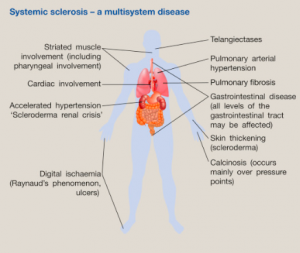SCLERODERMA


Scleroderma is a group of rare diseases that involve the hardening and tightening of the skin and connective tissues.
Scleroderma affects women more often than men and most commonly occurs between the ages of 30 and 50.
Clinical features:
• Skin: Hardening and tightening of patches of skin. These patches may be shaped like ovals or straight lines, or cover wide areas of the trunk and limbs. The number, location and size of the patches vary by type of scleroderma. Skin can appear shiny because it’s so tight, and movement of the affected area may be restricted.
• Fingers or toes : Raynaud’s disease, which causes the small blood vessels in your fingers and toes to contract in response to cold temperatures or emotional distress. When this happens, fingers or toes may turn blue or feel painful or numb.
• Digestive system. Scleroderma can cause a variety of digestive symptoms, depending on which part of the digestive tract is affected. If the esophagus is affected, you might have heartburn or difficulty swallowing. If the intestines are affected, you might have cramps, bloating, diarrhea or
• Heart, lungs or kidneys. Scleroderma can affect the function of the heart, lungs or kidneys to varying degrees. These problems, if left untreated, can become life-threatening.
Complications : Scleroderma complications range from mild to severe and can affect:
• Fingertips. The variety of Raynaud’s disease that occurs with systemic scleroderma can be so severe that the restricted blood flow permanently damages the tissue at the fingertips, causing pits or skin sores. In some cases, the tissue on the fingertips may die and require amputation.
• Lungs. Scarring of lung tissue can result in reduced lung function, which can impact your ability to breathe and tolerance for exercise.
• Kidneys. When scleroderma affects your kidneys, you can develop elevated blood pressure and an increased level of protein in your urine. More-serious effects of kidney complications may include renal crisis, which involves a sudden increase in blood pressure and rapid kidney failure.
• Heart. Scarring of heart tissue increases your risk of abnormal heartbeats and congestive heart failure, and can cause inflammation of the membranous sac surrounding your heart. Scleroderma can also raise the pressure on the right side of your heart and cause it to wear out.
• Teeth. Severe tightening of facial skin can cause your mouth to become smaller and narrower, which may make it hard to brush your teeth or to even have them professionally cleaned. People who have scleroderma often don’t produce normal amounts of saliva, so the risk of dental decay increases even more.
• Digestive system. Digestive problems associated with scleroderma can lead to heartburn and difficulty swallowing. It can also cause bouts of cramps, bloating, constipation or diarrhea.
• Sexual function. Men who have scleroderma may experience erectile dysfunction. Scleroderma may also affect the sexual function of women by decreasing sexual lubrication and constricting the vaginal opening.
Treatment
• NSAIDS.
• Steroids and other immunosuppressants
• Drugs to boost blood flow to your fingers
• Anti hypertensives
• Drugs to open blood vessels or to keep tissue from scarring
• Antacids
• Medications to help move food through your intestines
• Prevent infections. Antibiotic ointment, cleaning and protection from the cold may help prevent infection of fingertip ulcers caused by Raynaud’s disease. Regular influenza and pneumonia vaccinations can help protect lungs that have been damaged by scleroderma
Other things that help may include:
• Avoid cold exposure
• Exercise
• More fiber and fluids in your diet
• Skin treatment, including light and laser therapy
• Physical and Occupational therapy
• Stress management


